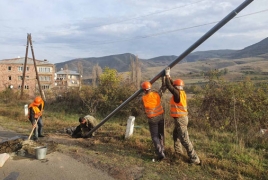Viva-MTS, FPWC bringing more street lighting projects to rural Armenia November 21, 2020 - 17:14 AMT PanARMENIAN.Net - Viva-MTS and the Foundation for the Preservation of Wildlife and Cultural Assets (FPWC), the two organizations that have joined to develop infrastructure in Armenian provinces, continue the construction and development works despite the challenges of 2020. Moreover, they have now included in the project the communities that suffered a lot due in the military hostilities in July. Aygepar, which is situated 1.5 km from state borders, was included in the infrastructure development project in September. The outdoor LED lighting system is an important part of ensuring the basic needs and safety of the local population. Currently, the pillar installation works are in the process. Project implementers put every effort to provide outdoor illumination by the end of the year. 25 lights will be installed in the settlement, which will cover around 900m of road area. “The pillars are installed only 1.5 km far from the military positions of the enemy. It’s not easy, as you never know when the shooting will start. We had quite serious damages in the village three months ago. Despite the borderland danger, we must develop our village. As long as we live in this village, we need to work and continue our life: nobody left the village after the recent military actions. We need to stand firmly on our land, become more strong and have more people in here, to be able to withstand the coming challenges,” said the acting administrative head of Aygepar settlement Arkadi Yamukyan. An energy-saving street lighting system has been built in another border village of the Tavush region, Vazashen. Only the central street of the village was lit with efficient, but mostly with very old lamps. Now, the most energy-efficient LEDs have been installed from the village entrance to the center. In the last stage of the project, 40 lights were installed illuminating around 1500 m. "The year created way too difficult problems for all of us. We had to limit ourselves to communicating remotely and to overcoming the serious challenges and problems we all encountered. Nevertheless, we had a goal, and along with our partners we became more determined to be useful to our compatriots who live on the border. Good and hard work, and the necessity to succeed should turn into a lifestyle. And it is a must required by the time we have, problems we encounter and the future," said Viva-MTS General Manager Ralph Yirikian. Works on infrastructure development in regions, including installation of LED lights, are implemented in accordance with program preliminary agreed between partners. "It was very hard to implement the project during wartime. We stopped the working process in the first days of the war, which escalated in September. We did not understand if it was possible to continue working or not. Most of the key specialists volunteered and went to the front. We carried out the work involving additional manpower from the villages. If I try to estimate, the program was implemented fairly quickly,” said the coordinator of the project, Martin Maralchyan. The construction works are finished in Vazashen and the system is launched. Viva-MTS and the Foundation for the Preservation of Wildlife and Cultural Assets (FPWC) continue the implementation of all projects as planned. The number of state universities will be reduced from 23 to 8 by 2030, Minister of Education, Science, Culture and Sport Zhanna Andreasyan has said. From September 21 to November 11, a total of 2,820 Russians registered at a place of residence in Armenia, the police has said. The situation on the contact line between Karabakh and Azerbaijan was relatively stable overnight, the Defense Army says. Defense Minister Suren Papikyan has visited the southern Armenian province of Syunik, the Defense Ministry reported on March 18. Partner news |